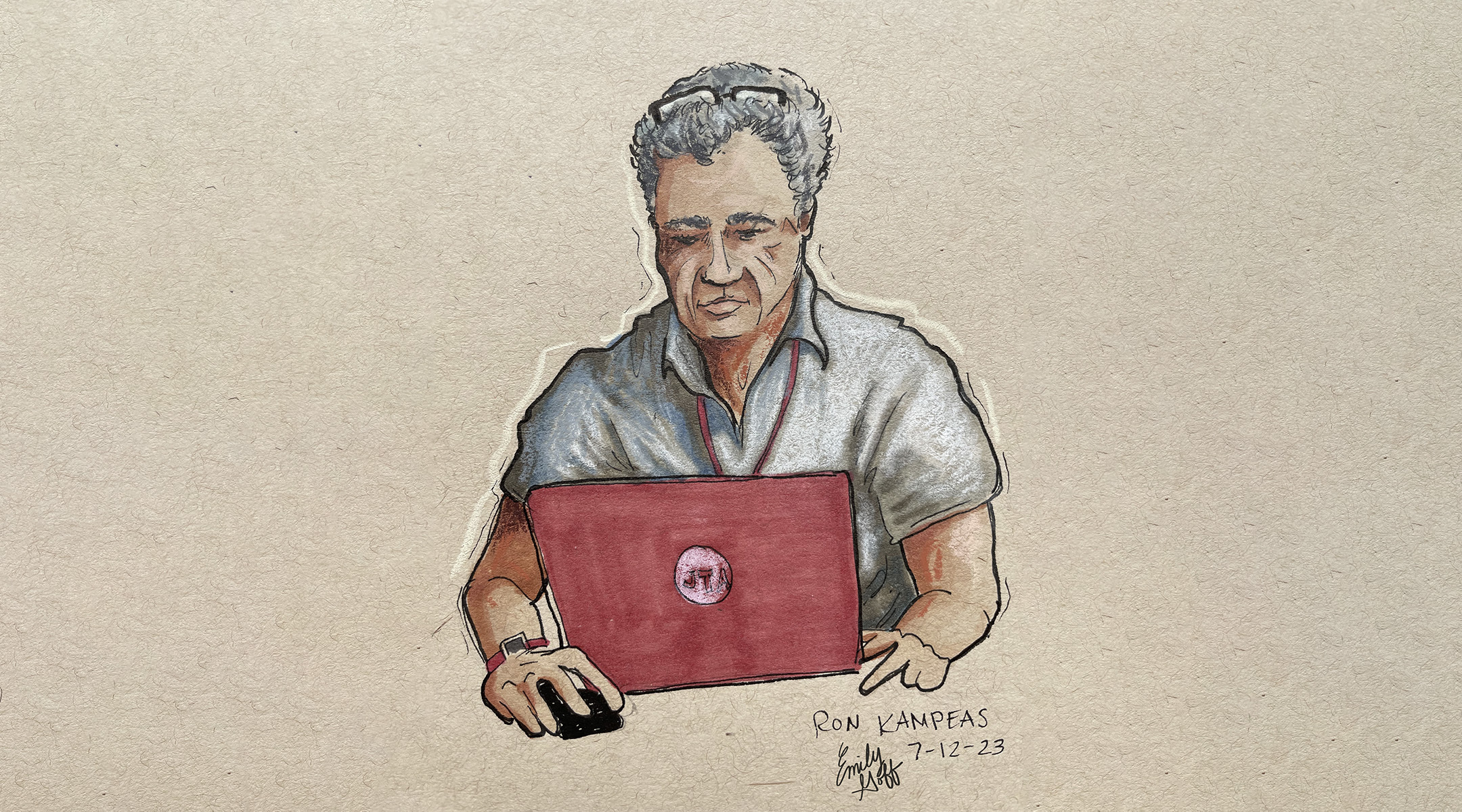For decades, Americans United for Separation of Church and State called its adversaries “religious extremists.” Today, the group has a more specific target: fighting Christian nationalism.
The decision to sharpen the language was made by Rachel Laser, the group’s president for the last six years. A Jew and the first religious minority to lead Americans United since its founding in 1947, Laser wanted the group to be more clear-eyed about what she sees as a growing threat to religious pluralism in the United States: the belief that American laws should favor Christian values over those of other religions.
But it was not an easy decision for her to make. “On some deep level, I worry about alienating Christians, as many Jews do,” Laser wrote last year in the group’s magazine. “When you are part of a mere 2% of the population, it can feel perilous to risk fostering adversity with 65% of the population.”
That anxiety about the optics of her leadership surfaced even before she took the job. During her interview, Laser recounted to the Jewish Telegraphic Agency, she asked the board outright: “Why aren’t you hiring Christian clergy?”
Americans United had always been led by pastors, but Barry Lynn, who served as the organization’s previous leader, from 1992 to 2018, said he welcomes a departure. If there were any concerns about having a Jew lead a fight against Christian nationalism, Laser has proven it’s possible to do so, he said.
“I’ve thought about that a lot, but I just don’t think it’s a burden or a problem because she works very collaboratively with board members who are themselves Christians and she works in coalitions,” Lynn said. “She understands the depths of the danger that Christian nationalism presents to both Christianity and to religious minorities.”
Laser, 55, is married to intellectual property lawyer Mark Davies. They have three children and the family belongs to Adas Israel, a Conservative congregation in Washington, D.C. She began her journey in Chicago, where she grew up with Jewish activist parents who didn’t prioritize religious life. But when she followed a friend to Sunday school, she encountered Rabbi Arnold Jacob Wolfe, a progressive Reform Jewish leader who was deeply involved in civil rights and other social justice causes.
“I was a very curious kid, and he encouraged me to ask questions,” Laser said, fighting back tears as she recalled Wolfe, who passed away in 2008. “The more questions I asked, the more he appreciated me. That’s why I value being Jewish.”
Laser (her name is pronounced LAZZ-er) carried those values into a career focused on public service. After earning a law degree, she held senior roles in organizations advocating for reproductive rights, LGBTQ equality, and interfaith dialogue, including as the deputy director of the Religious Action Center, the advocacy arm of Reform Judaism.
“She’s a knowledgeable Jew who cares deeply about Jewish concerns,” said Rabbi David Saperstein, who led the Religious Action Center during Laser’s time there. “She fit very comfortably into the Reform movement’s view that social justice was a central part of what it means to be a Jew.”
He said he hired her because she was already a proven bridge builder, and it was important for the organization to work across political and ideological lines in Washington. It’s a skill that would be critical when Americans United tapped her in 2018, tasking her with adapting the group for a polarized era.
She took the helm during the second year of Donald Trump’s first presidency, as debates over religion in public life were intensifying. Laser commissioned research to gauge public attitudes and test Americans United’s messaging.
The results were mixed. “Religious extremism” resonated with most audiences, but “Christian nationalism” was less familiar — and even sounded positive to some people. “We didn’t want people to think we were insulting Christianity or patriotism,” Laser said, so she decided against emphasizing the term.
Then came the January 6, 2021, assault on the U.S. Capitol.
Laser saw the insurrection as a wake-up call. In the rioters’ biblical rhetoric and religious rituals, she recognized Christian nationalism as a potent and underappreciated threat. She soon hired Andrew Seidel, a prominent critic of Christian nationalism. On his first day as the new vice president of strategic communications at Americans United, Seidel testified before Congress about the role of Christian nationalism in the Capitol insurrection.
Americans United began using the term regularly, aiming to educate the public while highlighting church-state separation as a critical countermeasure.
“The antidote to Christian nationalism is church-state separation,” Laser said in an interview. “It’s the kryptonite that prevents Christian nationalists from codifying their views into our laws.”
Under Laser’s leadership, Americans United has taken high-profile legal actions, such as suing Oklahoma over its proposed religious charter school and representing a Tennessee Jewish couple rejected by an adoption agency due to their faith. The group also helped raise awareness earlier this year about Project 2025, a detailed conservative proposal for Trump’s second term from the Heritage Foundation.
Donors have responded to these efforts. In 2023, the organization reported $17.9 million in revenue — more than double what it raised before Laser took over.
But Laser’s tenure hasn’t been without controversy. The organization’s employee union and some former board members have accused her of fostering a toxic work environment and prioritizing publicity over policy and legal work. After commissioning an outside investigation of the organization’s work culture, the board has said Laser has its full support.
Laser’s efforts to counter Christian nationalism reflect broader tensions in American society. While religious affiliation is declining, Trump’s political alliance with the Christian right has energized a vocal minority.
“I love you, Christians,” he said on the campaign trail. “In four years, you don’t have to vote again, we’ll have it fixed so good you’re not going to have to vote.” And the vast majority of them did vote for him.
Since the election, Trump has put together for his next administration a slate of deputies that reflects his strong political alliance with the Christian right, from his nominee for White House budget director Russell Vought to his preferred candidate for defense secretary, Pete Hesgeth.
But while giving Republicans a resounding victory, American voters also rejected many of the specific policies promoted by conservative Christians. In seven states, including four won by Trump, voters approved measures to protect abortion rights. All three state proposals to allow public funding to flow to private and religious schools were defeated. Laser calls these outcomes a rejection of Christian nationalism and a continued endorsement of the principle of church-state separation.
In saying that a solid majority of Americans agree with her worldview, Laser relies on surveys like those from the Public Religion Research Institute. “We find that by a margin of about two to one, most Americans reject Christian nationalism,” said PRRI’s president, Robert Jones.
He said he’s confident in the results because the statements the surveys test against are ”fairly unambiguous.”
“They’re things like, ‘U.S. law should be based on the Bible,’ ‘To be truly American, you must be Christian’ and ‘Christians should take dominion over all areas of American society,’” he said.
As the term “Christian nationalism” has come into play in recent years, Jones’ group has been studying how people respond not only to the underlying attitudes, but also to the term itself.
“We are finding people who qualify as Christian nationalists based on our criteria have a positive view of the term, and people who are rejecting that worldview have a negative view of the term,” Jones said. “So it’s not just a term used by one side to smear the other.”
The phenomena can be seen in the strong sales of a 2022 book called “The Case for Christian Nationalism,” by conservative political theorist Stephen Wolfe, and in prominent politicians, like U.S. Rep. Marjorie Taylor Greene and Sen. Josh Hawley, who have embraced the moniker.
But even as one term has become more common, the question of what language to use is far from settled. Advocates on either side of the debate over the place of religion in public life make various choices for strategic or other reasons.
Sorting through the rhetoric has required substantial attention from Ruth Braunstein, a professor of sociology at the University of Connecticut. That’s because earlier this year, she was awarded a grant from the Henry Luce Foundation to map out the individuals and groups fighting Christian nationalism.
Many of the 100 groups added to the list so far don’t use the term Christian nationalism.
“Some, for example, talk about defending or promoting pluralistic democracy,” Braunstein said. “Others talk about creating a more inclusive vision of American identity.”
A growing bunch, including Americans United, do. And for Braunstein, it was easy to figure out how Laser’s group fit into her project.
“They have a high profile, historical gravitas and respect, and the resources to be able to provide support to other organizations,” she said. “So I think of them as an important node in this broad network.”
A few weeks ago, Laser went on CNN to be briefly interviewed about her opposition to plans in Oklahoma and Texas to bring Christianity into the classroom. She didn’t mention anything about her identity. She simply delivered Americans United talking points: Parents, not politicians, should decide when and if children are exposed to religion; state mandates sully rather than enhance religion; mixing church and state goes against the country’s founding ideals.
But one viewer who contacted CNN to complain about Laser’s statements discovered through Google, or correctly assumed, that Laser is a Jew. He made her identity the center of a lengthy tirade, which he ended with a broad threat.
“When Jews go into the public square to attack Christianity, then we have a problem,” the angry viewer wrote. “Stop abusing the people that treat you kindly because, eventually, the patience will run out.”
Asked if this kind of threat gives her anxiety about the place of Jews in the United States, she said, “Firstly, I’m Jewish. There’s always anxiety. So, fair question.”
But then she went on to emphasize that she’s never felt alone in her activism. She’s always surrounded by Christian allies.
As soon as she took the helm, for example, she set up a faith advisory for Americans United and packed it with pastors (as well as other faith leaders). When her group files lawsuits against policies it opposes, it always includes Christian plaintiffs.
“It’s more important to make it clear that Christians are leaders in this cause,” she said. “In any case, however, I don’t plan to go anywhere. This country has given so much to Jews and I feel gratitude for that. I want to ensure that my kids and my kids’ kids can enjoy and be proud of the same America.”
Keep Jewish Stories in Focus.
JTA has documented Jewish history in real-time for over a century. Keep our journalism strong by joining us in supporting independent, award-winning reporting.









 English (US) ·
English (US) ·